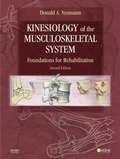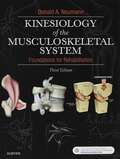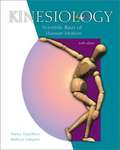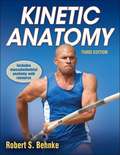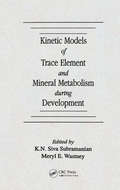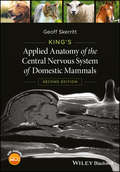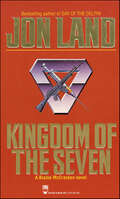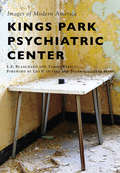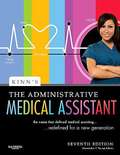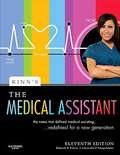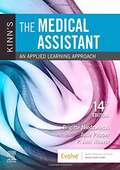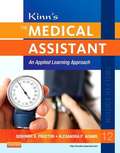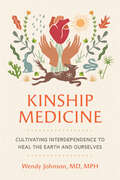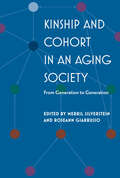- Table View
- List View
Kinesiology of the Musculoskeletal System - Elsevier on VitalSource: Foundations for Rehabilitation
by Donald A. NeumannUNIQUE! Clinical Connections boxes in each chapter enhance your understanding and promote practical application. Special Focus boxes and clinical examples throughout the text bridge classroom content with real-world application to help you succeed in practice. Logically organized content establishes an understanding of fundamental concepts before moving on to more complex material to make learning easier. Chapter outlines provide a framework for learning and enable you to reference specific topics at a glance. UNIQUE! A companion Evolve Resources website reinforces your understanding through kinesiology video clips and answers to study questions. UNIQUE! More than 500 high-quality, full-color illustrations clarify musculoskeletal anatomy and reinforce anatomic concepts. Study questions in each chapter test your comprehension and strengthen your critical-thinking capabilities.
Kinesiology of the Musculoskeletal System: Foundations For Rehabilitation
by Donald A. NeumannWith its focus on the normal and abnormal mechanical interactions between the muscles and joints of the body, Kinesiology of the Musculoskeletal System: Foundations for Rehabilitation, 3rd Edition provides a foundation for the practice of physical rehabilitation. This comprehensive, research-based core text presents kinesiology as it relates to physical rehabilitation in a clinically relevant and accessible manner. It provides students and clinicians with the language of human movement ― and acts as a bridge between basic science and clinical management. Full-color anatomic and kinesiologic illustrations clearly demonstrate the anatomy, functional movement, and biomechanical principles underlying movement; and dynamic new video clips help you interpret new concepts with visual demonstration.
Kinesiology: An Introduction to Exercise Science
by Ted TemertzoglouThe new Kinesiology goes beyond the curriculum, for a well-rounded understanding of the relevant concepts and issues. 45 special interest features will excite your students and stretch their imaginations. Features include: <p><p> Lifestyle Diseases <p> Gray’s Anatomy, 1858 <p> What Makes Usain Bolt Run <p> Long-Term Athlete Development <p> Yoga and Pilates
Kinesiology: Scientific Basis of Human Motion
by Nancy Hamilton Kathryn Luttgeosthe science of movement
Kinetic Anatomy (Third Edition)
by Robert BehnkeCreated primarily for those who will work in physical activity fields, the third edition of Kinetic Anatomy continues to building on its previous editions to assert itself as the ideal resource for learning structural anatomy and how it affects movement. The text gives students a firm concept of musculoskeletal anatomy by systematically assembling each component of the human body. Layer by layer, readers will study bones, ligaments, joints, and muscles on the bones, as well as the nerves and blood vessels that supply these muscles that are essential for movement. Kinetic Anatomy, Third Edition, includes coverage of three major structures that are not often considered when studying the anatomy of movement: the brain, heart, and lungs. As the centerpieces for the nervous, cardiovascular, and respiratory systems, these structures are essential to human movement and are highlighted throughout the text where appropriate. In addition, other fundamental features make this resource a valuable tool for learning and teaching human anatomy: - A one-year subscription to Musculoskeletal Anatomy Review, an online anatomy program, provides an interactive forum for reviewing regional structural anatomy. - A new chapter on the head completes the regional approach followed in the text. - More information on muscle and motor units helps broaden information on movement potential in selected sport activities. - Expanded discussion on joint strength and movement and the function of muscles (agonists, antagonists, stabilizers, and synergists), levers, and exercise supports understanding of how the human body is constructed. - Full-color photos and illustrations enhance the learning experience. - New Functional Movement Exercises provide students with the opportunity for practical application of their studies by asking them to identify the prime mover, antagonist, fixator, and synergist muscle in a particular movement. - Hands On exercises throughout the book offer students practice in physically identifying anatomical structures on themselves or on a partner. Included with each new text is a key code allowing students one-year access to the online anatomy program Musculoskeletal Anatomy Review. This engaging supplement to the text offers a regional review of structural anatomy with exceptionally detailed, high-quality graphic images--the majority provided by Primal Pictures. Students can mouse over muscles and click for muscle identification, and each chapter features a pretest and posttest evaluation to help students pinpoint knowledge gaps and test their retention. The pretest can be taken multiple times and is generated randomly so it will never be the same, but the posttest may be taken only once. Test results can be printed and turned in so instructors have the option to use the tests as a grading tool. To further facilitate learning, each chapter in the book concludes with a review of the key terms referred to in the chapter, suggested learning activities, and review questions in multiple-choice and fill-in-the-blank formats. The answers to the questions are provided at the end of the book. For instructors, a new image bank accompanies the updated instructor guide and test package to aid in delivering the course content. Kinetic Anatomy, Third Edition, is an outstanding introductory resource for those who plan to specialize in any field related to physical activity. Readers will learn what structures are involved in movement and how those structures should function, allowing them to identify problems and correct them to enhance physical activity.
Kinetic Models of Trace Element and Mineral Metabolism During Development
by K. N. Siva Subramanian Meryl E. Wastney-PentchevKinetic models are becoming standard tools in the research of biological systems. They are used to represent hypotheses, analyze data, and design experiments to maximize the information obtained from a study. Kinetic Models of Trace Element and Mineral Metabolism During Development describes models for calcium, chromium, copper, iron, iodide, lead, mercury, selenium, zinc, and others in health and disease.
King's Applied Anatomy of the Abdomen and Pelvis of Domestic Mammals
by Geoff SkerrittDiscover a unique approach of combining descriptive anatomy with clinical information on the abdomen and pelvis of domestic mammals King’s Applied Anatomy of the Abdomen and Pelvis of the Domestic Mammals delivers a thorough and accessible exploration of the abdominal and pelvic anatomy of domestic animals in a clinically relevant style. Designed as a refresher for veterinary students beginning to engage in clinical procedures, the book uses clinical illustration to teach the essential principles of how the abdomen and pelvis of domestic mammals are constructed. It covers core topics such as: Thorough introductions to the body wall, the mesenteries and ligaments of the abdomen and pelvis, and the gastrointestinal tract Explorations of the liver and the pancreas, the spleen and abdominal lymphatics, and the biology of digestion Practical discussions of the autonomic and somatic nerves of the abdomen and pelvis and the male and female reproductive organs Treatments of laparotomy and diagnostic imaging of the abdomen and pelvisPerfect for veterinary students studying anatomy, King’s Applied Anatomy of the Abdomen and Pelvis of the Domestic Mammals will also be useful to practicing veterinary practitioners, students of veterinary nursing, and people studying animal science and related disciplines.
King's Applied Anatomy of the Central Nervous System of Domestic Mammals
by Geoff SkerrittAn update of a classic student text unlocking the mystery of veterinary neurology and neuroanatomy King′s Applied Anatomy of the Central Nervous System of Domestic Mammals, Second Edition is an ideal introduction for those with no prior knowledge of the central nervous system. Presented in a logical and accessible manner, readers can quickly comprehend the essential principles of how the central nervous system is constructed, the way it works and how to recognise damaged components. By blending descriptive anatomy with clinical neurology, the text offers a unique approach - explaining the structure and function of the central nervous system while highlighting the relevance to clinical practice. Revised and updated to cover the latest clinical developments, this second edition includes additional content on electrodiagnostic methods, stem cell transplantation and advanced imaging. The book also comes with a companion website featuring self-assessment questions, label the diagram exercises, and downloadable figures to aid further learning. An excellent introductory text for veterinary students, King′s Applied Anatomy of the Central Nervous System of Domestic Mammals, Second Edition is also an invaluable reference for trainee veterinary neurology specialists as well as veterinary practitioners with a particular interest in neurology.
King's Applied Anatomy of the Central Nervous System of Domestic Mammals
by Geoff SkerrittAn update of a classic student text unlocking the mystery of veterinary neurology and neuroanatomy King's Applied Anatomy of the Central Nervous System of Domestic Mammals, Second Edition is an ideal introduction for those with no prior knowledge of the central nervous system. Presented in a logical and accessible manner, readers can quickly comprehend the essential principles of how the central nervous system is constructed, the way it works and how to recognise damaged components. By blending descriptive anatomy with clinical neurology, the text offers a unique approach – explaining the structure and function of the central nervous system while highlighting the relevance to clinical practice. Revised and updated to cover the latest clinical developments, this second edition includes additional content on electrodiagnostic methods, stem cell transplantation and advanced imaging. The book also comes with a companion website featuring self-assessment questions, label the diagram exercises, and downloadable figures to aid further learning. An excellent introductory text for veterinary students, King's Applied Anatomy of the Central Nervous System of Domestic Mammals, Second Edition is also an invaluable reference for trainee veterinary neurology specialists as well as veterinary practitioners with a particular interest in neurology.
Kingdom of the Seven: A Novel (The Blaine McCracken Novels)
by Jon LandDr. Karen Raymond has made the medical breakthrough of the century, a vaccine that could halt the spread of our most devastating modern plague, AIDS. But when her laboratory is destroyed and her colleagues murdered, she realized she's in danger: a conspiracy of proportions she never dreamed possible is out to crush her work.In another part of the country the population of an entire town has disappeared into thin air, leaving behind only half-finished meals, empty offices and schools.Who is responsible? A cabal of power-seeking corporations? Rogue victims of Army medical experiments gone horribly wrong? Who is behind the traitorous plot that threatens to sacrifice our country to the Kingdom of the Seven?At the Publisher's request, this title is being sold without Digital Rights Management Software (DRM) applied.
Kings Park Psychiatric Center (Images of Modern America)
by Tammy Rebello L.F. BlanchardKings Park Psychiatric Center, or "the Psych Center" as it is known locally, was unique for its time, as its focus was on patient care and making the hospital as "homelike" as possible. The facility was made up of a series of smaller buildings to give the feeling of community to the patients and staff alike, and both men and women were treated fairly and humanely. Long Island was home to many immigrants, some of whom had difficulty adjusting to life in the United States. This unique population led to interesting personal stories of those who worked at this facility, those who were institutionalized, and their families. The authors took the time to listen to their stories and endeavored to understand their pasts and recognize how these events continue to influence the mental-health industry today. Pictured throughout are the physical relics of the now-abandoned Psych Center, where these stories unfurled.
Kinn's The Administrative Medical Assistant: An Applied Learning Approach (7th Edition)
by Alexandra Patricia Young-AdamsThis edition incorporates a unique approach called An Applied Learning Approach which introduces students to the concepts of critical thinking and the impact of individual learning styles on student success. The text provides practical, real-world administrative skills essential for success in the health care office. This updated edition combines current, reliable content with innovative support tools to help you confidently prepare for today's competitive job market.
Kinn's The Medical Assistant: An Applied Learning Approach
by Alexandra Patricia Young Deborah B. Proctor Alexandra Patricia AdamsThe most comprehensive medical assisting resource available, Kinn's The Medical Assistant, 11th Edition provides unparalleled coverage of the practical, real-world administrative and clinical skills essential to your success in health care. Kinn's 11th Edition combines current, reliable content with innovative support tools to deliver an engaging learning experience and help you confidently prepare for today's competitive job market. Study more effectively with detailed Learning Objectives, Vocabulary terms and definitions, and Connections icons that link important concepts in the text to corresponding exercises and activities throughout the companion Evolve Resources website and Study Guide & Procedure Checklist Manual. Apply what you learn to realistic administrative and clinical situations through an Applied Learning Approach that integrates case studies at the beginning and end of each chapter. Master key skills and clinical procedures through step-by-step instructions and full-color illustrations that clarify techniques. Confidently meet national medical assisting standards with clearly identified objectives and competencies incorporated throughout the text. Sharpen your analytical skills and test your understanding of key concepts with critical thinking exercises. Understand the importance of patient privacy with the information highlighted in helpful HIPAA boxes. Demonstrate your proficiency to potential employers with an interactive portfolio builder on the companion Evolve Resources website. Familiarize yourself with the latest administrative office trends and issues including the Electronic Health Record. Confidently prepare for certification exams with online practice exams and an online appendix that mirrors the exam outlines and provides fast, efficient access to related content. Enhance your value to employers with an essential understanding of emerging disciplines and growing specialty areas. Find information quickly and easily with newly reorganized chapter content and charting examples. Reinforce your understanding through medical terminology audio pronunciations, Archie animations, Medisoft practice management software exercises, chapter quizzes, review activities, and more on a completely revised companion Evolve Resources website.
Kinn's The Medical Assistant: An Applied Learning Approach
by Julie Pepper Brigitte Niedzwiecki P. Ann WeaverMore than any other product on the market, the most successful Medical Assistants begin their careers with Kinn. Trusted for more than 60 years, Kinn's The Medical Assistant: An Applied Learning Approach, 14th Edition, teaches you real-world administrative and clinical skills essential for a career in the modern medical office – always with a focus on application through unfolding case scenarios, critical thinking questions, procedure videos, and interactive exercises. The reorganized 14th edition includes expanded content on medical office accounts, collections, banking, and practice management as well as a new chapter reviewing medical terminology, anatomy and physiology, and pathology. With an easy-to-read format and a full continuum of separately sold adaptive learning solutions, real-world simulations, EHR documentation experience, and HESI remediation and assessment ― you’ll learn the leading skills to prepare for certification and a successful career in the dynamic and growing Medical Assisting profession! Comprehensive coverage of all administrative and clinical procedures prepares you for a wide array of Medical Assisting jobs. Nearly 185 step-by-step illustrated procedures with rationales break down how to perform critical skills for practice. Applied approach to learning helps you use what you’ve learned in a real-world setting, including case scenarios, critical thinking exercises, procedures videos, and interactive online activities. Thorough EHR coverage with access to hands-on activities incorporates use of SimChart® for the Medical Office, software designed to ensure that you are practice-ready (sold separately). Robust companion website includes procedures videos, chapter quizzes, and sample certification exams, and interactive exercises. Key vocabulary terms and definitions are presented at the beginning of each chapter and highlighted in text discussions. Summary of Learning Objectivesserves as a checkpoint and study tool. Patient education and legal and ethical features help relate content to practical use. NEW! Chapter reviews medical terminology, anatomy and physiology, and pathologyto help you build a solid foundation. NEW! Reorganized and expanded content on medical office accounts includes collections, banking, and practice management. NEW! Artwork focused on the workings of a modern medical office, includes updated illustrations and photographs of procedures and medical records. NEW! Expanded and updated sample certification exams help you practice and prepare for certification. NEW! Streamlined presentation refines organization and writing for easy comprehension. NEW! Coverage of patient-centered care featured throughout textbook.
Kinn's The Medical Assistant: An Applied Learning Approach (12th Edition)
by Deborah B. Proctor Alexandra Patricia AdamsPrepare for a successful career in medical assisting! Kinn's The Medical Assistant, 12th Edition helps you learn the real-world administrative and clinical skills essential to working in the health care setting. Administrative coverage ranges from professionalism and interpersonal skills to billing and coding and electronic health records; clinical content teaches how to assist with medications, diagnostic procedures, and surgeries. And no other comprehensive medical assisting text can match its coverage of assisting with medical specialties! Written by medical assisting experts Alexandra Adams and Deborah Proctor, this classic resource also includes an Evolve companion website with practical exercises and activities, videos, and review questions for the CMA and RMA certification exams.
Kinn's the Administrative Medical Assistant: An Applied Learning Approach
by Deborah B. Proctor Julie Pepper Brigitte Niedzwiecki Payel MaderoAdministrative Medical Assisting begins with Kinn! Elsevier’s Kinn’s The Administrative Medical Assistant, 13th Edition provides you with the real-world administrative skills that are essential to working in the modern medical office. An applied learning approach to the MA curriculum is threaded throughout each chapter to help you further develop the tactile and critical thinking skills necessary in today’s healthcare setting. Paired with our adaptive solutions, EHR documentation, ICD-10 coverage and, detailed procedural videos, you will learn the professional and interpersonal skills of modern administrative medical assisting!
Kinn's the Administrative Medical Assistant: An Applied Learning Approach
by Julie Pepper Brigitte Niedzwiecki P. Ann WeaverMore than any other product on the market, the most successful Medical Assistants begin their careers with Kinn. <p><p> Trusted for more than 60 years, Kinn's The Administrative Medical Assistant: An Applied Learning Approach, 14th Edition teaches you real-world administrative skills essential for a career in the modern medical office – always with a focus on application through unfolding case scenarios, critical thinking questions, procedure videos, and interactive exercises. <p><p> The reorganized 14th edition includes expanded content on topics from professionalism and interpersonal skills to billing and coding, electronic health records, and practice management as well as a new chapter reviewing medical terminology, anatomy and physiology, and pathology. With an easy-to-read style and practical focus, paired with a full complement of separately sold adaptive solutions, real-world simulations, EHR documentation experience, and HESI remediation and assessment ― you’ll learn the leading skills to prepare for certification and a successful career in the dynamic and growing Medical Assisting profession.
Kinship Medicine: Cultivating Interdependence to Heal the Earth and Ourselves
by Wendy Johnson MD, MPHFor fans of Braiding Sweetgrass, The Future We Choose, and The Blue Zones, a book about the effect our relationship to nature has on our well-being and health.Our modern way of living is incompatible with our survival. Most of us intuitively know this truth, but almost everything in our society encourages us to ignore it. Dr. Wendy Johnson confronts this undeniable fact and breaks down how we think and act every day in ways that undermine our individual and collective well-being.The antidotes to many of the causal factors of poor health—loneliness, industrial diets, systemic inequality, fear of death, profit-based healthcare—are relational, with each other and with the living earth. Through evidence from public health, sociology, anthropology, human ecology, and her experience as a family physician, Dr. Wendy Johnson will show you how:We must incorporate an &“ecosystem&” perspective into modern medicineWhat you ingest and where you live can reinforce or upset your body&’s delicate balanceEliminating one organism in an ecosystem can affect all the othersHistories of trauma can be passed down for generationsRekindling our relationships to non-human life is essential to our well-beingBeing closer to death can release some of its power over usActions of communities will be stronger and more lasting than any individual effortsYou will leave with a clear vision of what a new society might look like, methods to accomplish this transformation, and concrete examples of where it is being done successfully.
Kinship and Cohort in an Aging Society: From Generation to Generation
by Merril Silverstein Roseann GiarrussoAccording to family sociologist Vern Bengtson, generations within families are important sources of influence, change, and development.Kinship and Cohort in an Aging Society brings together scholars whose common link is their intellectual intersection with the work of Vern Bengtson, an esteemed family sociologist whose accomplishments include foundational theoretical contributions to the study of families and intergenerational relations as well as the development of the widely used Longitudinal Study of Generations data set. The study began in 1971 and is the basis for Bengtson’s highly influential concept and measurement model, the intergenerational solidarity-conflict paradigm. This book serves as an excellent compendium of original research that examines how Bengtson’s solidarity model, a theory that informs nearly all intergenerational and gerontology sociology work performed today, continues to be relevant to scholars and practitioners.Written by internationally recognized scholars, the book’s fifteen chapters are mapped to five major thematic areas to which Bengtson’s research contributed: family connections; grandparents in a changing demographic landscape; generations and cohorts (micro-macro dialectics); religion and families in the context of continuity, change, and conflict; and global cross-national and cross-ethnic concerns. Key strengths of the book include the diversity of foci and data sources and the strong attention given to global and international issues.Kinship and Cohort in an Aging Society will appeal to scholars working in sociology, psychology, gerontology, family studies, and social work.
Kinship and Gender
by Linda StoneDesigned for undergraduate courses in kinship, gender, or the two combined, Linda Stone's Kinship and Gender is the product of years of teaching. The topic of kinship comes alive when linked to gender issues; conversely, the cross-cultural study o. . .
Kissing the Wind
by A E HotchnerFrom the author of the international bestseller Papa Hemingway, based on his own experiences: the story of a man struggling to overcome a rare syndrome that causes terrifying hallucinations, who eventually, despite the odds, finds love.Chet Tremaine is living his best life. A successful lawyer with a loyal best friend, the arts and culture of New York City at his doorstep, and a peaceful retreat in Connecticut, Chet has it figured out. Even when a freak tennis accident leaves him blind in one eye, Chet is confident he'll be able to bounce back. But then he starts hallucinating: unknown children playing in his living room, pine needles seasoning his salad, wire grids barring access to his bathroom. His doctor allays his worst fears, only to deliver an even more shocking diagnosis: Chet's eye injury has left him with Charles Bonnet syndrome, and this rare disease is incurable. Chet is going to be plagued by these hallucinations for the rest of his life.His social life impaired, his job in jeopardy, Chet is close to becoming a recluse when he helps a woman who's collapsed on a Manhattan street corner. She turns out to be Emma Vicky, a warm and witty British actress who suffers from Ménière's disease, a condition that causes severe vertigo. Like Chet, she feels restrained by her chronic illness and terribly isolated--until their meeting renews her desire to open up, let another person in. But Chet can't make the same leap. Instead, he decides to make a final Hail Mary attempt to find a cure, embarking on a spiritual quest that will take him all the way to the mountains of Nepal. By turns funny, harrowing, and inspirational, Kissing the Wind is A. E. Hotchner's final, and finest, achievement. AN ANCHOR ORIGINAL.
Kisspeptin Signaling in Reproductive Biology
by Jeremy T. Smith Alexander S. KauffmanKisspeptin has been shown to be both necessary and sufficient for activation of the reproductive axis, during puberty and later in adulthood. This makes kisspeptin a fundamental component of the reproductive axis. Kisspeptin has been deemed the single most potent stimulator of GnRH neurons yet known. The importance of kisspeptin has been documented in humans as well as non-human animal models, ranging from monkeys, sheep, and rodents to numerous fish species, thus signifying a highly conserved nature of its reproductive function. Importantly, kisspeptin neurons seem to mediate many of the regulatory effects of other signals, whether they are metabolic, circadian, hormonal, or stress. This places kisspeptin neurons in a unique position to be key nodal points and conduits for conveying numerous endogenous and exogenous signals to the reproductive axis.
Kitchen Pollutants Control and Ventilation: A Ventilation Guide to Asian & European Kitchen Environment
by Angui Li Risto KosonenThis book has been written by two experts in ventilation and indoor air quality with vast experience in the field of kitchen ventilation in both Asia and Europe. The authors share their extensive knowledge of the subject and present the results of their research programs as well those of other researchers. Discussing advanced theories of and design approaches for kitchen ventilation, it is a useful reference resource for a wide range of readers, including HVAC researchers, designers and architects.
Kitchen Table Wisdom: Stories that Heal
by Rachel Naomi RemenDoctor shares her journey as a healer and patient.
Klachten na kanker: Praktisch handboek voor de eerste lijn
by Mariken Stegmann Daan BrandenbargEen groeiende groep patiënten geneest na de diagnose kanker. Zij pakken hun levenweer op maar kunnen specifieke klachten houden of krijgen die terug te voeren zijn opde ziekte of behandeling daarvan. De klachten kunnen liggen in het fysieke, psychische,sociale of existentiële domein. Denk bijvoorbeeld aan neuropathie, angst, vragen overwerk, seks en zingeving. Vaak zullen patiënten met deze klachten aankloppen in de eerstelijn en lang niet altijd leggen zij zelf het verband met hun eerdere diagnose.Dit boek behandelt in korte, overzichtelijke hoofdstukken de klachten waarmee patiëntenmet kanker in de voorgeschiedenis zich presenteren. Het biedt huisartsen, praktijkondersteunersen andere zorgverleners in de eerste lijn informatie, casuïstiek en vooralpraktische handvatten om te gebruiken in de zorg voor patiënten met klachten na kanker.Er zijn ook persoonlijke ervaringen van patiënten met kanker in het boek opgenomen diebeschrijven wat een bepaalde klacht voor hen betekent of betekend heeft.Ieder hoofdstuk is geschreven door een duo bestaande uit een expert op het specifiekevakgebied en een huisarts.
